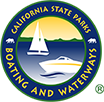
California has more than one million motorized boats and an estimated four million recreational boaters visit marinas, lakes, rivers and the ocean every year seeking an enjoyable outdoor recreational experience.
Oil and fuel contain harmful components which can affect human health and severely damage our aquatic environment (even very small quantities). A single pint of oil released into the water can cover one acre of a waterbody, impact drinking water and the aquatic ecosystem.
As a boater, you love being out on the water and have a stake in clean, healthy waterways. In order to ensure that your experience is a safe and enjoyable one, it is important for you to follow some clean boating practices that will help to prevent oil spills in the water.
Practice Preventive Engine Maintenance:
- Regularly inspect lines and hoses for deterioration, and fix small leaks that drip oil into the bilge. Also, replace oil pan gaskets and oil seals whenever the motor is removed for maintenance. This will reduce leakage and save you money in the long run.
- If you change your own oil, use a closed system -a portable vacuum oil change pump that drains into a closed container to prevent spills during transfer of oil to a recycling facility or used oil collection center (available at most marine supply stores). Recycle your used oil and used oil filter at a certified used oil collection center or call 1-800-CLEANUP or visit www.earth911.org for recycling locations.
Use Oil Absorbents and Don’t Pump Oily Bilge Water Overboard
- Oil absorbents are the least expensive method boaters can use to control oily discharges. Oil absorbents (available at most marine supply stores) absorb oil while repelling water and come in many shapes and sizes.
- Use oil absorbent sheets, pads or commonly known as “diapers” for oil drips under the engine and in the bilge and to remove oil sheen on the water. These absorbents can also be used while fueling your boat or when filling a portable tank. Absorbent Socks or pillows are designed for use in deeper bilge compartments.
- If you have an extremely oily bilge, consider using a bilge pumpout service that properly disposes of the wastewater. If the bilge and/or engine compartment still needs significant cleaning after bilge pumpout, use a steam cleaning service.
- Considering the fact that bilges can be humid, which can cause mildew and algae to grow, consider the following alternative to toxic products:
- Make a paste of equal parts of either lemon juice or vinegar and salt. Let the paste sit, scrub, and then clean with a rag.
- For more severe problems, scrub spots/bilge with borax/ water mix. See other alternatives for less toxic cleaning products.
PRECAUTIONS:
- When using absorbents in the bilge, secure them to prevent clogging or fouling the bilge pump and the bilge pump float or sensor.
- Check saturation of absorbent periodically. When fully saturated, remove absorbent and place it in a leak-proof bag or container.
How to discard used oil absorbents?
- In California, absorbents saturated with oil are presumed to be hazardous waste and should not be thrown in the garbage. Proper disposal options include:
- Oil Absorbent Exchange Centers: This service is offered by some marinas and fuel docks that actively distribute and collect oil absorbents for free. Ask your marina operator about local resources to properly dispose of saturated absorbents.
- Bring your used oil absorbents to your County local household hazardous waste collection center. For locations visit Cal Recycle.
MORE INFORMATION:
Learn more about boat–to-boat mobile services.
Learn more about environmental laws associated with oil and fuel. .
OIL POLLUTION PREVENTION
For your own health, the health of others and the health of the environment, it is extremely important that you, as a boater, take responsibility to implement clean and safe boating practices.
